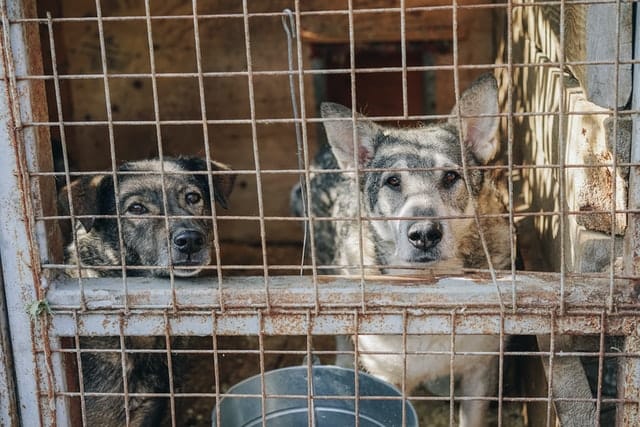
The Covid pandemic and lockdowns sparked an upsurge in demand for pups in the United Kingdom, resulting in skyrocketing prices, increasing unethical black-market breeding, and worsening animal health.
Illegal dealers from three or four known families in Ireland are believed to be shipping consignments of poorly bred pups worth up to £40,000 across the Irish Sea a couple of times a week.
It is predicted that 80% of these trafficked dogs will be ill by the time they arrive in Scotland, owing to their early separation from their mothers and the cramped conditions of their transport.
The smuggling is currently focused on Scotland, where demand for pups has increased dramatically in recent months.
A pup recently sold for $15,000+ in Glasgow at one auction, while pet shops are importing pups from Ireland up to five times a week.
The Scottish Society for the Prevention of Cruelty to Animals has apprehended 298 dogs from Ireland in the last three years, however, it is believed that only a small portion of the terrible animal trade between the two countries.
It is hoped new sentencing guidelines that would result in a five-year prison sentence will act as a deterrent to offenders.
An undercover inspector with the Royal Society for the Prevention of Cruelty to Animals says that unless more is done, people will continue to exploit these profits.
In response to concerns raised by the public and BSP, the official stated, “It’s definitely an Irish issue.
A few well-known prolific families are bringing pups into Scotland and selling them online, and around 80% of these pups become severely ill with many of them dying.
Most of the illegal dealers entering Scotland come from Ireland, but it’s hard to prove who is doing the smuggling”.
On the low side, families were earning around £40,000 from a single shipment—revenue that might reach millions in a year.
“We know they are traveling several times each week. They offer a variety of breeds, including black Labradors, French bulldogs, and dachshunds.”
The puppies are thought to originate from puppy farms, where breeding standards are virtually non-existent.
The puppy farmers have shown a callous disregard for the puppies’ well-being, which is frequently taken from their mothers at an early age.
They are kept in cramped and unsanitary circumstances before being sold when they can catch the potentially deadly canine parvovirus or Campylobacter, a germ that leads to intestinal infections and diarrhea.
The pups are transported in cramped conditions, stacked on top of one another in black bin bags that are sealed with tape to keep them quiet.
When they try to breathe through the plastic, their muzzles become damp with saliva and their breath condenses on the inside of the plastic bag, suffocating them slowly.
“The dealers don’t care about the dogs’ well-being. There are puppy farms where the conditions are inhumane, according to the inspector.”
Their welfare has been totally jeopardized. Many of them aren’t vaccinated. They don’t want to take these dogs to a veterinarian because they don’t want them microchipped or registered.
The inspector informed us that puppy-dealing families are now transporting smaller consignments of dogs with multiple family members on ferries to avoid being discovered.
“We used to see couriers or unlawful dealers driving up with 20 pups crammed in their backseat — now they’re bringing smaller consignments and claiming they’re family pets if they’re stopped at the port.
They could be traveling with three to five puppies, but there might be eight family members on the boat with the same number of dogs.”
The inspector urged the Irish public to contact any information on illegal puppy operations.
“Any information on individuals entering Scotland with dogs would be very helpful. It’s quite hard, there are so many boats sailing every day. You might be able to tell the condition of their welfare right away, but you may also get groups that appear to be good on the ferry.”
A five-year sentence for bringing puppies into Scotland unlicensed would act as the perfect deterrent, the RSPCA inspector said.
“We’re also calling on people to look out for where they are buying their pups from and do all they can to avoid supporting this industry.”


GIPHY App Key not set. Please check settings